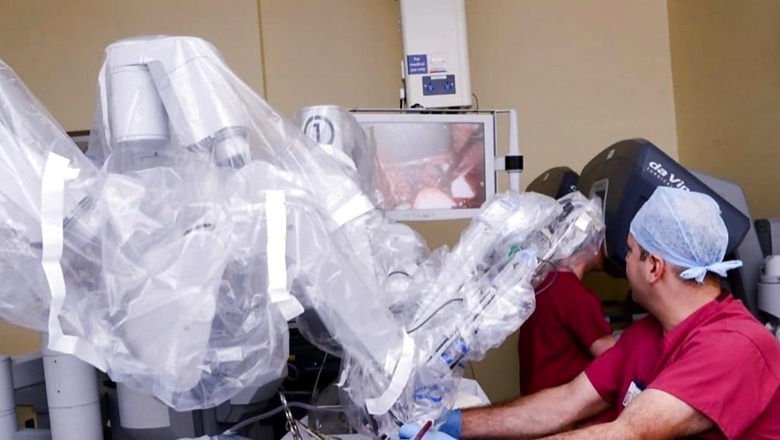
views
Esophageal cancer, a malignancy of the esophagus (the muscular tube connecting your throat to your stomach), often goes unnoticed until later stages. This silence can be attributed to a lack of awareness and the subtlety of early symptoms. Yet, with knowledge and vigilance, we can turn the tide against this aggressive disease. This article sheds light on esophageal cancer, focusing on dysphagia, a common symptom, and explores the potential of robotic-assisted surgery as a treatment option.
Understanding Esophageal Cancer:
- Esophageal cancer arises when malignant cells develop in the tissues of the esophagus. Our esophagus acts like a muscular tube, a one-way street for food traveling from mouth to stomach. Esophageal cancer disrupts this system.
- Abnormal cells take over, either in the squamous cells (often linked to smoking and alcohol) or the glandular cells (sometimes associated with a precancerous condition called Barrett’s esophagus).
- Notorious for its silent progression, this type of cancer often remains asymptomatic until reaching advanced stages. When symptoms do manifest, they typically include difficulty swallowing (dysphagia), unintended weight loss, chest pain, and regurgitation.
Dysphagia: A Warning Sign Not to Ignore
Dysphagia, or difficulty swallowing, is one of the hallmark symptoms of esophageal cancer. It occurs when the tumour obstructs or narrows the esophageal passage, impeding the smooth passage of food and liquids. Initially, dysphagia may be subtle, with individuals experiencing minor discomfort or occasional episodes of choking. However, as the cancer progresses, swallowing becomes increasingly challenging, leading to:
- Needing to wash down food with liquids more frequently
- Feeling like food gets lodged in the chest
- Pain while swallowing
- Regurgitation (bringing food back up)
- Unexplained weight loss
- Malnutrition
While dysphagia can occur for other reasons, it’s crucial to seek medical attention, especially if it’s new, persistent, or accompanied by other symptoms like heartburn, chest pain, or hoarseness. Early diagnosis is critical to improving treatment outcomes.
Treatment Options for Esophageal Cancer: Focus on Robotic-Assisted Surgery
The treatment approach for esophageal cancer is contingent upon factors such as cancer stage, type, and overall patient health. Historically, treatment has encompassed a combination of chemotherapy, radiation therapy, and surgical intervention. However, the introduction of robotic-assisted surgery has notably transformed the surgical paradigm for this disease.
In my experience, robotic-assisted surgery, using advanced systems such as the da Vinci, offers several advantages over conventional techniques. One of the primary advantage is precision. Surgeons have high-definition, three-dimensional views, enabling meticulous tumour removal while sparing healthy tissue, reducing the risk of disease recurrence.
Additionally, robotic-assisted procedures are minimally invasive. Unlike traditional open surgeries requiring large incisions, robotic-assisted surgery involves smaller, more precise incisions. This approach results in reduced pain, scarring, and infection risk for esophageal cancer patients, promoting faster healing and recovery.
Patients undergoing robotic-assisted surgery typically experience shorter hospital stays and faster recovery times compared to traditional surgery. The combination of smaller incisions, reduced trauma, and enhanced precision allows for expedited healing and rehabilitation. By minimising disruption to healthy tissues, robotic surgery enhances the overall safety and efficacy of esophageal cancer treatment.
While robotic-assisted surgery represents a significant advancement in the treatment of esophageal cancer, it is often employed in conjunction with other modalities to achieve optimal outcomes.
- Chemotherapy, administered either before or after surgery, plays a crucial role in shrinking the tumor, making it more amenable to surgical removal
- Radiation therapy may also be utilized to target and destroy cancer cells, either as a standalone treatment or in combination with surgery and chemotherapy
- Additionally, Immunotherapy has emerged as a promising avenue in cancer treatment, harnessing the body’s immune system to identify and eradicate cancer cells
- These complementary treatment modalities, when integrated with robotic-assisted surgery, form a comprehensive approach to combating esophageal cancer, offering patients the best chance for successful outcomes and improved quality of life.
The Road Ahead: Early Detection and Minimally Invasive Techniques:
Remember, knowledge is power!
Esophageal cancer can be a daunting diagnosis, but advancements in treatment offer hope. Early detection remains critical. If you experience persistent dysphagia or other concerning symptoms, consult your doctor promptly. Lifestyle changes like quitting smoking, limiting alcohol intake, and maintaining a healthy weight can help reduce your risk. Robotic-assisted surgery is emerging as a promising minimally invasive option, offering patients several benefits. While it’s not suitable for every case, discussing this option with your doctor can empower you to make informed decisions about your treatment plan.
(Inputs by Dr Mahesh Patel, Surgical Oncologist and robotic surgeon, Zydus Hospital, Ahmedabad)




















Comments
0 comment